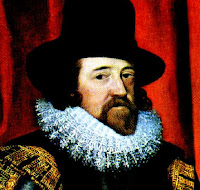“Because true history propoundeth the successes and issues of actions not so agreeable to the merits of virtue and vice, therefore poesy [i.e., poetry] feigns them more just in retribution, and more according to revealed Providence. Because true history representeth actions and events more ordinary and less interchanged, therefore poesy endueth them with more rareness and more unexpected and alternative variations. So as it appeareth that poesy serveth and conferreth to magnanimity, morality and to delectation. And therefore, it was ever thought to have some participation of divineness, because it doth raise and erect the mind, by submitting the shows of things to the desires of the mind; whereas reason doth buckle and bow the mind unto the nature of things. And we see that by these insinuations and congruities with man’s nature and pleasure, joined also with the agreement and consort it hath with music, it hath had access and estimation in rude times and barbarous regions, where other learning stood excluded.”—English philosopher, scientist, essayist, and statesman Sir Francis Bacon (1561-1626), The Advancement of Learning (1605)
Subscribe to:
Post Comments (Atom)

No comments:
Post a Comment